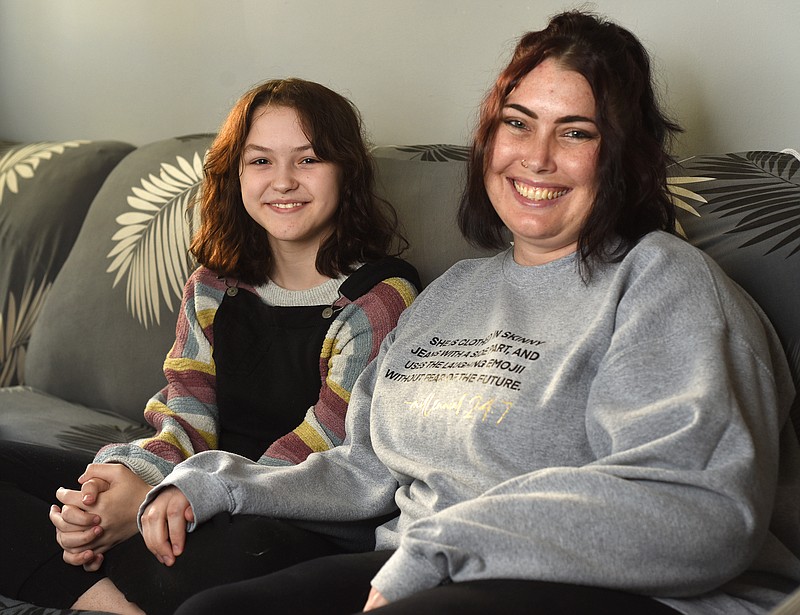Stephanie Wilson remembers April 12 so well that when her mind replays the images, her voice breaks.
"I'd worked most of the day," she said, haltingly. "My boss asked to speak with me at 1:30. (Later,) they walked me into a conference room where the HR rep was and let me go.
"It took me three years to get where I was in that company. I loved that job and tried every day to show them how grateful I was."
A single mom whose 13-year-old daughter, Emmaleigh Eaglebarger, was struggling with mental health issues, Wilson said she started immediately to look for work. Finally, she said, she had to seek help in mid-summer at the United Way of Greater Chattanooga.
"It was tough to make that call," Wilson, 36, said. "When you're a single mom, there's a stigma when you ask for help.
"This is not the life dream I had planned, but I still have to take care of my daughter."
(READ MORE: Times Free Press Neediest Cases Fund 'changed life' of Hixson's Bryant Ellis)
Wilson got the help she needed from the Chattanooga Times Free Press Neediest Cases Fund, but she said the way United Way offered that help meant at least as much as the funds.
"United Way was very kind -- no judgement, no stigma," she said. "It was very quick and easy -- 'Send us copies of your bills, and we'll get those taken care of,' they said.
"No second guessing," she said. "They just helped."
Wilson recalled that, after her dismissal on that April day, she went to her daughter at her aunt's home.
"I couldn't go in, I was crying so hard. I was in a really bad place, and I didn't know what I was going to do," she said. "My aunt came outside, and I told her I'd just gotten fired. I felt like an absolute failure."
Wilson said she found a job in May, then shifted a month later to a work-from-home job. She said she left that job in August because she was all set to take another -- until she contracted COVID-19 and broke her foot the same week.
"I was supposed to start Aug. 15, but I had to give up that position," she said. "I couldn't risk spreading COVID, and there was no one to drive me to work."
She recovered, though, and then, in September, came a cafeteria job at East Ridge High School. She said she had to take a temporary leave from that job but is scheduled to go back to work Dec. 1.
"I really love the people I work with," said Wilson, who took a moment to offer a full-throated endorsement of her workplace's cuisine.
"People say, 'Oh, it's just because you work there,' but I really like our cafeteria food," she said with a laugh. "Chicken fajitas, rattlesnake pasta, stuff like that. I know not everyone agrees, but it's really good."
Wilson's footing might be more solid than it was, but she said she's not done. She's set to begin tutoring part-time at United Way and is waiting to hear about a part-time, work-from-home data-entry job for which she's applied.
"(The cafeteria job) is 7:15 to 1:30 Monday through Friday," she said. "Tutoring would be 30-to-60-minute sessions three or four days a week, and I've signed up for afternoons and weekends. (Data entry) would be a minimum of 10 hours a week.
"It can feel like a mountain on your shoulders, but you do what you have to do to make things work."
That includes seeking help when necessary, Wilson said, as she did when she approached United Way.
"Don't be afraid to ask," she said. "There are people in the world who are kind and willing to help without judgement."
The Times Free Press Neediest Cases Fund was started in 1914 by Adolph Ochs, then the publisher of the Chattanooga Times. The Fund receives donations from Times Free Press readers. Money is administered and distributed to individuals and families in need by the United Way of Greater Chattanooga and partner agencies. Recipients must be working or on a fixed income and be able to demonstrate ongoing stability and self-sufficiency after receiving Neediest Cases funds.
According to United Way figures, the Neediest Cases Fund took in $81,000 last year and, in turn, helped 79 adults and 61 children in 54 households. Neediest Cases money went in 2020 to 60 adults and 40 children in 42 households.
Contact Bob Gary at bgary@timesfreepress.com.
